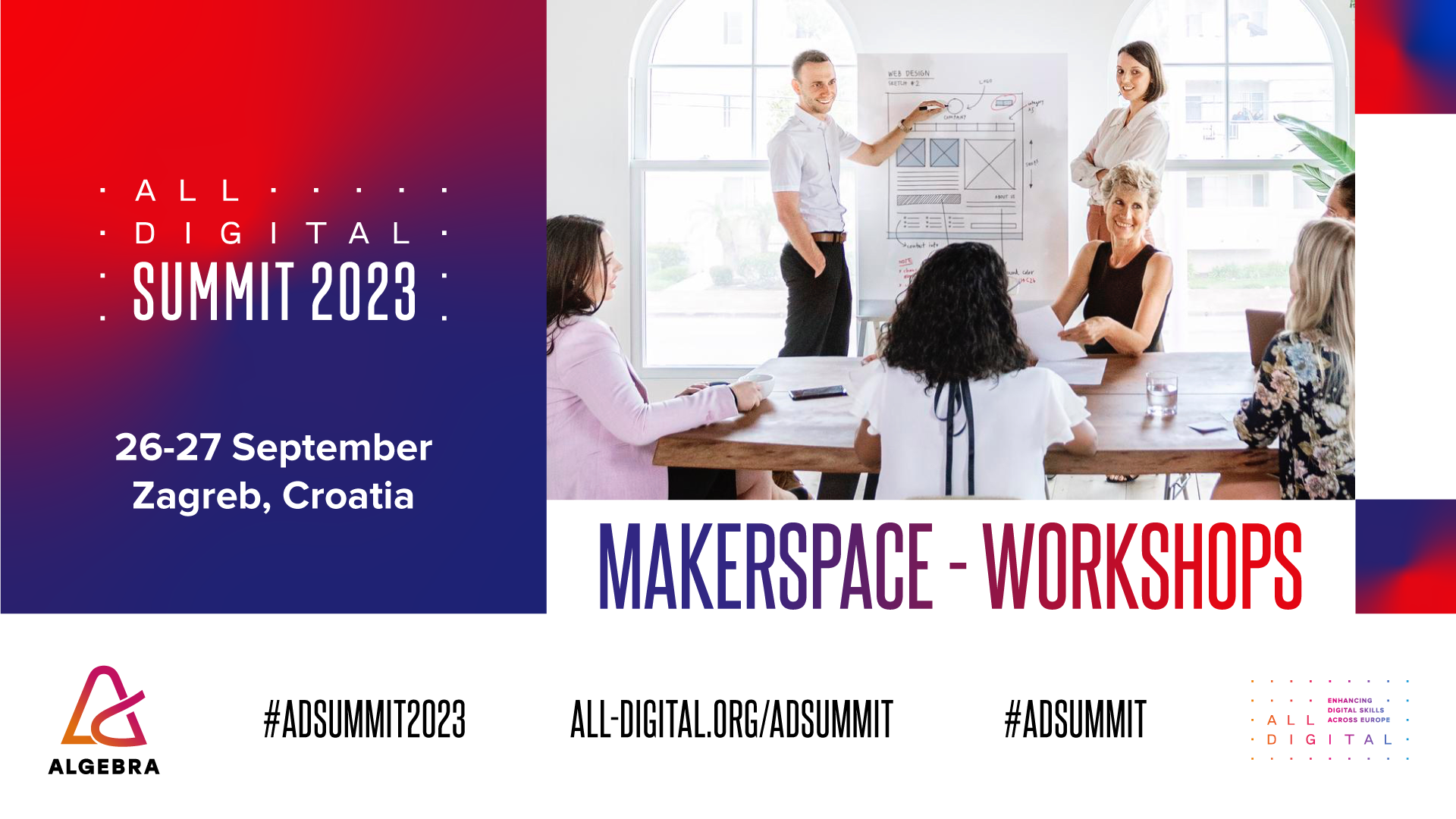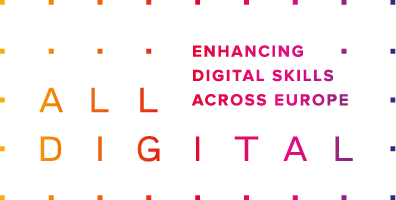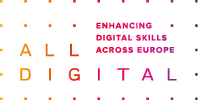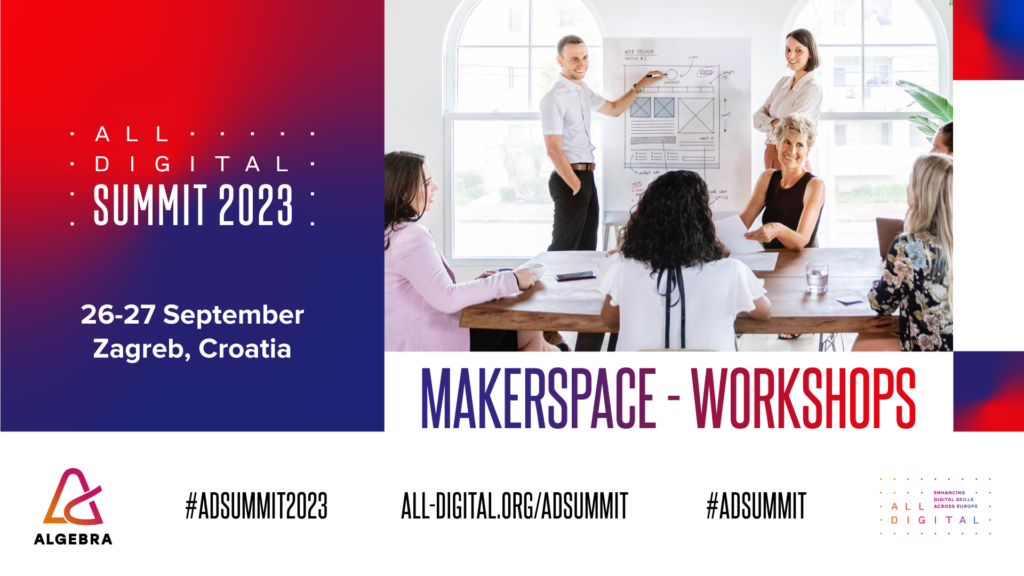
11 Sep Makerspace – Workshops @ADSummit 2023
11 Sep, 2023
Concept
The makerspace is a space where over 2 days, 8 ALL DIGITAL members will present and demonstrate workshops on practical skills they implement in their projects.
The sessions will begin with a short presentation to pitch and explain the methodology of the 2/3 scheduled workshops (5 minutes for each presenter). Then the participants will choose the workshop they want to take part in and will be split into 2/3 groups. The trainers will deliver the workshops for about an hour and 15’ of group work.
Presenters
The workshops will be organised by and cover respectively:
- HoU, EPMA, AGILE2Learn
- ALDA, E-participatory and e-democracy
- COLECTIC, Data Control Wars
- AI4AL project, AI-Driven Skill Profiling for Education and Career Orientation
- Langas I Ateiti, Empowering critical thinking education in local communities
- EPMA, VPN project on the understanding of digital technology by young people
- Mediawijs, Policy tools for digital inclusion
- Maks, Stories that matters – Methodology on active citizenship in vulnerable youth
Workshops
Tuesday 26.09 – 11.50-13.20
HoU, EPMA, Agility in educational practices
Practical workshop based on outcomes of the Agile2Learn project
The Agile2Learn project introduces the Agile Project Based Learning into education as a new enhanced educational approach to promote the development of key transversal competencies needed in the 21st century. Project Based Learning (PBL) is a well-known approach where students apply their knowledge to solve authentic problems and produce results that matter. PBL students take advantage of digital tools to produce high quality, collaborative products. In Agile2Learn project, PBL techniques are reinforced with Agile pedagogy to achieve enhancement in the classroom.
In the first part of the workshop, the participants will try a “taste” of the agile approach. They will try out the agile method in a simple and quick way, understand what it consists of and what are its advantages. In the second part of the WS, there would be a guided discussion with the project participants sharing their best practices so that the participants can imagine how agile works in practice. In the third, facilitation, part we would lead the participants to think individually about how the introduction of agile methods could help them in their practice and what concrete individual steps they can take to do so.
The goal of the entire WS is to understand the benefits of an agile approach and to realize how participants can apply it in their own work context or offer it to their stakeholders. The will specifically understand what they need to do and what steps they should take to do so. This all will be done in the context of the 21 module based course designed and piloted throughout the course of the project and corresponding platform containing an international community of practice. Both ready online to be used by interested users and stakeholders.
The workshop will be facilitated by:
Zuzana Krejcova (EPMA) and Achilles Kameas (HOU)
ALDA Workshop, Enhancing citizens’ participation through digitalisation
Considering the great, solid and long-lasting collaboration between ALDA and local authorities; taking into account the importance of leveraging digital technologies for cities to improve the quality of the lives of their citizens; keeping in mind the key role of digital education to empower citizens and make their voice heard; we would like to implement a short training on e-participation and e-democracy, based on ALDA’s experience in this field.
Programme based on non-formal education methods:
- Where do you stand? – A short energizer (around 10′) to investigate participants’ perceptions, opinions and awareness on e-democracy and e-participation;
- Presentation by ALDA on e-democracy and e-participation (about 15′) to provide an overview of the targeted topics, tools, good practices and successful stories;
- Scenario simulation on the creation of a smart city and community through citizens’ involvement and e-participation; 2 consequent activities would be proposed:
- Online survey (15′ for its distribution and results collection): Is your city as Smart as you are?. The survey will be available on online tools – such as Kahoot / Slido – to investigate citizens’ (= training participants) concerns in their urban environment, to know their opinion on the current status and on the potential smartness of their city. The focus would be on education, mobility, infrastructures, and sustainability issues;
- Working groups (about 45′): How would you make your city Smarter? This group discussion activity aims at discussing the potential smart solutions to be implemented in their cities and territories that would improve the citizens’ quality of life.
COLECTIC, “Data Control Wars pitch”
The workshop is based on a serious roleplaying game about how data control means controlling the world.
Multiple possible futures are pulsating in the present. In the context of surveillance capitalism and the growing algorithmic governance of society, various agents organize themselves and mobilize their resources so that tomorrow is as close as possible to what they want.
Many FLOSS (Free/libre Open Source Software) initiatives develop technologies with the aim of pursuing a more fair and democratic society, where people have greater control over their data and their lives together. However, these ways of understanding the relationship between society and technology have to compete with others that prioritize economic profit over people’s life improvement, such as the one promoted by the big Silicon Valley corporations.
Data Control Wars makes evident these struggles for the conquest of the future through an experimental game, where various actors will confront each other using technologies and ways of understanding and managing data to influence the world we will live in tomorrow.
Data Control Wars is a serious game about about how data control means controlling the world.
Tuesday 26.09 – 15.00-15.30
AI4AL, Workshop: AI-Driven Skill Profiling for Education and Career Orientation
AI4AL is an Erasmus+ funded project to facilitate a mindful adoption of AI technologies in the Adult Learning and Education (ALE) sector. The project is developing a methodology and a tool with the direct involvement of adult educators and offer training opportunities for the application of AI technologies in ALE.
The consortium is organising a session to test with educators the new tool it developed. The workshop aims at equipping educators with the means for better skills needs assessment, personalised training offers and career orientation by teaching the fundamentals of an AI-driven skill-profiling and career orientation tool.
Prior registration required: this workshop is only open to ALL DIGITAL Summit 2023 participants, so if you haven’t done so, please register to the summit here. Are you already registered to the summit? Then just express your interest to join the AI-tool testing workshop by filling out this registration form. We will get back to you with confirmation and further technical details to prepare for the session.
Langas I Ateiti, ‘‘Empowering critical thinking education in local communities“
The workshop will be based on the educational materials of the project „Empowering critical thinking education in local communities“ which has the goal to strengthen media literacy in schools. The project focuses in particular on school librarians who, by working in the field of information and media literacy and by reaching out to the wider school community, will be able to use the resources developed by the project to pass on the knowledge and skills of critical thinking to other teachers, students and their parents. The project is funded by European Media and Information Fund.
Are you interested in media literacy education? Join us for this workshop, where we will present the project vision, involve participants in educational activities of critcal thinking and provide the space to share valuable experience of workshop participants.
The workshop will be facilitated by:
Laura Grinevičiūtė (VIPT association) and Rita Šukytė (Association „Langas I Ateiti“)
EPMA, Vivier de Projets Numériques (VPN)
VPN, meaning Pool of Digital Projects in French, is a European project of the Erasmus+ programme aiming at putting digital technology at the service of youth associations’ projects.
Coordinated by Animafac (French association) and built with Actions Média Jeunes (Belgian association), EPMA (Czech association) and Hello Asso (ethical French company) over two years, this project will create 5 intellectual productions to promote the understanding of digital technology by young people involved:
- Tutorials for creating websites, applications, media, online events and video games
- A guide to digital project management,
- A series of videos to understand the societal and environmental challenges of digital technology,
- An interactive questionnaire to help young people certify their digital skills,
- A collection of European good practices to encourage the emergence of digital projects.
Each of these productions are accompanied by resources to create training frameworks and workshops that were organised by each of the associations in order to disseminate the project and the tools produced to young people and trainers. Finally, an international training course was also organised to allow an intercultural exchange and new collaborations between young people from different countries.
We would like to share these outputs with the AD members because we think it can be a valuable material to use for youth digital education
Wednesday 27.09 11.50-13.20
Mediawijs, Policy tools for digital inclusion
In the last years, Mediawijs developed two tools to help local governments and organisations in welfare to develop a policy on digital inclusion. The starting point is an analysis of the current situation and context, followed by a workshop in which future priorities are set. For this, we use building blocks, pointing out on which elements you can work to improve digital inclusion. Based on the selected building blocks and all the input from the workshop, a policy is developed. In this workshop session we will guide the participants through the steps of this process and introduce them the different building blocks.
Both tools will be introduced, the exercises will focus on the policy tool for welfare organisations.
Maks, “Stories That Matter”
Stories that Matters brings together Serbian and Belgian teachers around a newly developed methodology “Digital Design for Change” in a small-scale Erasmus partnership between Maks vzw and Vega Youth Center.
This four-step design thinking methodology can be used to work with youngsters (+12) on societal issues and guide them to co-create solutions. During the workshop, we will highlight the four steps we used, show some results of previous workshops, and experience some exercises.
Veronique de Leener, MAKS Director, will deliver a workshop where participants can experience the interactive methodology in 45 minutes.






